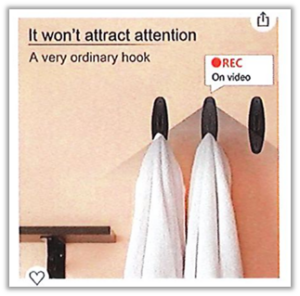A federal court in West Virginia recently ruled that a negligence claim could proceed against Amazon related to a spy camera used to take unsolicited photos of a teenage girl. M.S. v. Amazon.com, Inc., No. 3:23-cv-0046, 2023 U.S. Dist. LEXIS 213236 (S.D. W. Va. Nov. 30, 2023). The negligence claim is specifically interesting for subrogation professionals as it potentially provides an additional avenue for recovery against Amazon in addition to a product liability claim.
In 2021, the plaintiff, M.S. (a minor), visited the United States as a foreign-exchange student. During her stay, she lived with Darrel Wells, a 55-year-old man. Mr. Wells purchased a spy camera that was disguised as a bathroom towel hook on Amazon. The camera was listed for sale by an unknown third party and satisfied through the “Fulfillment by Amazon” program. The product description showed the camera serving as a towel hook with the caption: “It won’t attract any attention[:] A very ordinary hook,” as shown in the photo below from the pleading.

The camera was motion-activated and did not alert individuals it was recording. Mr. Wells installed the camera in M.S.’s private bathroom and took unsolicited photos of her.
M.S. filed a lawsuit against Amazon alleging negligence, among other claims. The court denied Amazon’s motion to dismiss the negligence claim pursuant to Rule 12(b)(6). Although M.S. asserted other claims against Amazon, the negligence claim is specifically interesting for subrogation professionals because it is different from the traditional product liability claim asserted against Amazon in property subrogation cases.
In evaluating the negligence claim, the court rejected Amazon’s argument that it owed no duty of care to M.S. as it is an online store that merely connects buyers and sellers, finding that the plaintiff alleged that Amazon’s involvement in the sale of the camera ran much deeper. The plaintiff alleged that Amazon failed to properly inspect the camera on three separate occasions before it was sold to Mr. Wells. First, the plaintiff alleged the camera was inspected by Amazon’s “Product Safety Team,” which investigates and acts on reported safety complaints and incidents to protect customers from the risks of injury related to products sold on Amazon’s website. Second, the plaintiff alleged the camera was inspected by Amazon’s “Dangerous Goods Team” because the camera contained lithium-ion batteries. Lastly, the plaintiff alleged the camera was inspected as part of Amazon’s “Fulfillment by Amazon” program, which provides logistics for third-party products sold on the website. In addition, with respect to Amazon’s usual argument that it merely published the content of others, the plaintiff alleged that Amazon exercised control over the camera’s product description, including photos encouraging the use of camera in a private bathroom as a towel hook.
The court determined that the plaintiff’s allegations “permit the inference” that Amazon knew that its acts or omissions might expose others to a foreseeable risk that a third party would use the camera as advertised – to secretly record a person in a private bathroom by using the camera as a towel hook. Although the court admitted that West Virginia courts have yet to apply tort principles to Amazon’s “novel business model,” it explained that it could look to other jurisdictions for guidance.
The content on Amazon’s website and the way in which a product is sold may provide a subrogating carrier an avenue for pursuing a negligence claim, in addition to any potential product liability claims, against Amazon. To pursue Amazon, a subrogation professional must review the product listing and customer reviews on Amazon’s website. The product listing may contain misleading, questionable, or false information regarding the quality, purpose or capabilities of the product. In addition, customer reviews may contain accounts from prior users regarding issues with the product that, arguable, put Amazon on notice. This content, available on Amazon’s website, may reveal a foreseeable risk that leads to a duty owed by Amazon to its customers (i.e., the subrogating carriers’ insureds). A subrogation professional must also determine whether the product was sent through the “Fulfillment by Amazon” program, which creates additional support for the assertion that Amazon knew or should have known that the product posed a foreseeable risk of injury. A thorough investigation of the product, Amazon’s inspection process and its control over the published content for the product may allow a subrogating carrier to successfully plead and pursue a negligence action against Amazon, in addition to a product liability claim
Recent Posts
Categories
- Products Liability
- CPSC Recalls
- Subrogation
- Construction Defects
- Statute of Limitations-Repose
- California
- New York
- Evidence
- Minnesota
- Experts – Daubert
- Maryland
- Jurisdiction
- Condemnation
- Rhode Island
- Experts - Reliability
- Podcast
- CPSC Warning
- Anti-Subrogation Rule
- Workers' Compensation
- Uncategorized
- Negligence
- Contracts
- Cargo - Transportation
- Landlord-Tenant
- Sutton Doctrine
- Waiver of Subrogation
- Arbitration
- Pennsylvania
- Texas
- AIA Contracts
- Florida
- Economic Loss Rule
- Malpractice
- Wyoming
- Spoliation
- Tennessee
- Water Loss
- Indiana
- Michigan
- Comparative-Contributory Negligence
- Contribution-Apportionment
- Assignment
- Missouri
- Parties
- Public Policy
- Arkansas
- Civil Procedure
- New Jersey
- Res Judicata
- Product Liability
- Damages
- Damages – Personal Property
- Arizona
- Certificate of Merit
- Litigation
- West Virginia
- Oklahoma
- Georgia
- Limitation of Liability
- Builder's Risk
- Contractual Subrogation
- Equitable Subrogation
- Illinois
- Insurable Interest
- Mississippi
- Made Whole
- Delaware
- Settlement
- Subrogation – Equitable
- Construction
- Premises Liability
- Joint or Several Liability
- Montana
- Duty
- Privity
- New Mexico
- Right to Repair Act
- Massachusetts
- Landlord
- Tenant
- Building Code
- Causation
- Architects-Engineers
Tags
- Subrogation
- Products Liability
- Podcast
- Subro Sessions
- Construction Defects
- California
- Product Liability
- New York
- Experts
- Minnesota
- Circumstantial Evidence
- Evidence
- Malfunction Theory
- Jurisdiction
- Inverse Condemnation
- Maryland
- Texas
- Statute of Repose
- Waiver of Subrogation
- Condemnation
- Rhode Island
- Experts – Daubert
- Contracts
- Jurisdiction - Personal
- CPSC Recalls; Products Liability
- Negligence
- Landlord-Tenant
- Pennsylvania
- Civil Procedure
- Georgia
- Amazon-eBay
- Statute of Limitations - Accrual
- Economic Loss Doctrine
- Certificate of Merit
- Experts - Reliability
- Made Whole
- Louisiana
- Florida
- Anti-Subrogation Rule
- Construction Contracts
- Illinois
- New Jersey
- Parties
- Ohio
- Experts – Qualifications
- Right to Repair Act
- Statute of Limitations - Tolling
- Contracts - Enforcement
- Indiana
- Design Defect
- Sutton Doctrine
- West Virginia
- Arizona
- Spoliation
- Water Damage
- Connecticut
- Damages
- Privity
- Evidence - Hearsay
- Condominiums
- Massachusetts
- Tennessee
- Statute of Limitations
- Limitation of Liability
- workers' compensation subrogation
- Apportionment
- Exculpatory Clause
- Arbitration
- Negligence – Duty
- Wisconsin
- Expert Qualifications
- Workers’ Compensation
- Amazon
- Public Policy
- Missouri
- Negligent Undertaking
- Statute of Limitations - Contractual
- Delaware
- Indemnification
- Architects-Engineers
- Loss of Use
- Vehicles
- Washington
- AIA Contract
- Settlement
- Res Judicata
- Warranty - Implied
- Statute of Limitations - Repose
- Improvement
- Michigan
- Idaho
- Malpractice
- Internet Sales
- Non-Party at Fault
- Spoliation – Fire Scene
- Gross Negligence
- Mississippi
- Statute of Limitations – Discovery Rule
- Malfunction Theory; Design Defect
- Cargo-Transportation
- Contribution
- Independent Duty
- Implied Warranty of Habitability
- Warranty - Construction
- North Carolina
- Utah
- Standing
- Comparative Fault
- Res Ipsa
- New Mexico
- Contracts - Formation
- Unconscionable
- Failure to Warn
- Manufacturing Defect
- Pleading
- Removal
- Entire Controversy Doctrine
- Motion to Intervene
- Nevada
- Subrogation; High-Net-Worth; Damages; Art; Cargo-Transportation; Anti-Subrogation Rule
- Virginia
- Burden of Proof
- Products Liability – Risk-Utility
- Lithium-ion battery
- New Hampshire
- Anti-Subrogation Rule; Wyoming; Landlord-Tenant; Sutton Doctrine
- Oklahoma
- Sanctions
- Builder’s Risk
- Contractual Subrogation
- Equitable Subrogation
- Insurable Interest
- Joint-Tortfeasors
- Arkansas
- Kentucky
- Daubert
- Fire - Cigarettes
- Colorado
- Causation
- Discovery-Sanctions
- Third Party
- Accepted Work
- Montana
- Independent Contractor
- Privilege
- Betterment
- Damages-Code Upgrades
- Insurance Coverage
- First Party Claims
- Forum-Venue
- Warranty – Express
- AIA Contracts
- Anti-Indemnity Statutes
- Discovery - Experts
- Products Liability - Foreseeability
- MCS-90
- Substantial Completion
- Reimbursement
- Assignment
- Counterclaim
- Products Liability; Malfunction Theory
- Economic Loss Rule
- Unfair Trade Practices
- Evidence – Probative Value
- Parties – Real Party in Interest
- Status of Repose
- Evidence - Public
- Construction Defects - Fixtures
- Subrogation – Equitable
- Additional Insured
- Contract
- Trespass
- COVID-19
- Damages – Emotional Distress
- Incorporation by Reference
- Oregon
- Third Party Spoliation
- No-Fault Subrogation
- Products Liability; Mississippi
- Jury Instructions
- Food and Beverage
- California Court of Appeals Holds Subrogating Carrier Cannot Assert Claims of Its Suspended Insured
- South Carolina
- Debt Collection
- Montreal Convention
- Medical Benefits
- Immunity
- Products Li
- Wyoming
- Release
- Liens
- Kansas
Authors
Archives
- April 2025
- March 2025
- February 2025
- January 2025
- December 2024
- November 2024
- October 2024
- September 2024
- August 2024
- July 2024
- June 2024
- May 2024
- April 2024
- March 2024
- February 2024
- January 2024
- December 2023
- November 2023
- October 2023
- September 2023
- August 2023
- July 2023
- June 2023
- May 2023
- April 2023
- March 2023
- February 2023
- January 2023
- December 2022
- November 2022
- October 2022
- September 2022
- August 2022
- July 2022
- June 2022
- May 2022
- April 2022
- March 2022
- February 2022
- January 2022
- December 2021
- November 2021
- October 2021
- September 2021
- August 2021
- July 2021
- June 2021
- May 2021
- April 2021
- March 2021
- February 2021
- January 2021
- December 2020
- November 2020
- October 2020
- September 2020
- August 2020
- July 2020
- June 2020
- May 2020
- April 2020
- March 2020
- February 2020
- January 2020
- December 2019
- November 2019
- October 2019
- September 2019
- August 2019
- July 2019
- June 2019
- May 2019
- April 2019
- March 2019
- February 2019
- January 2019
- December 2018
- November 2018
- October 2018
- September 2018
- August 2018
- July 2018
- June 2018
- May 2018
- April 2018
- March 2018
- February 2018
- January 2018
- December 2017
- November 2017
- October 2017
- September 2017
- August 2017
- July 2017
- June 2017
- May 2017
- April 2017
- March 2017
- February 2017
- January 2017
- December 2016
- November 2016
- October 2016
- September 2016
- August 2016
- July 2016
- June 2016
- May 2016
- April 2016
- March 2016
- February 2016
- January 2016
- December 2015
- November 2015
- October 2015
- September 2015
- August 2015
- July 2015
- June 2015
- February 2015
- January 2015
- November 2014
- October 2014
- September 2014
- May 2014
- April 2014
- December 2013
- August 2013
- May 2013
- February 2013


